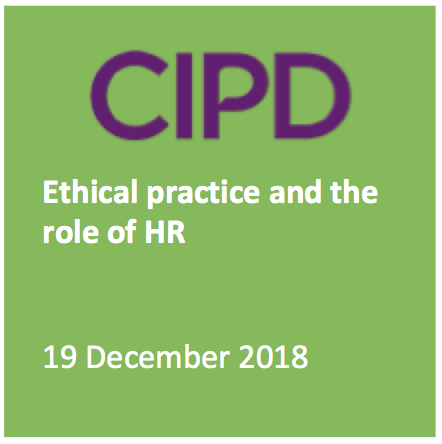learning resources
Business ethics and HR
Overview
Welcome to these learning resources on business ethics and the role of HR. In the audio clip (to the right) your HR tutor Andrew gives an overview of the purpose and content of this learning, and below is a summary of how this fits with the CIPD units.
The resources are divided into three sections, enabling you to complete learning in sections as required.

1. Business ethics - defined
The Oxford English Reference Dictionary provides the following definition:
- Ethics is ‘the rules of conduct recognised as appropriate to a particular profession or area of life’.
Whilst this makes sense, it doesn’t help us understand how ethics applies to organisations and indeed the HR profession. It helps to look at an example of unethical behaviour.
Activity
In February 2019 a story hit the headlines involving Oxfam workers and alleged sexual exploitation in Haiti. As the story unravelled it became clear that the situation was more complex than just a small number of employees. The links below take you to timelines on The Guardian and BBC websites that map out how the story unfolded.
Task – starting with The Guardian link, read through the timeline and make a note of the following areas:
- What actions did those involved take and why might these be considered as unethical?
- What actions did the organisation take? Did these improve or worsen the situation?
- What impact did this and the media coverage have on Oxfam? You may want to refer to the BBC source for more detail here.
2. The role of HR
Now we have a better understanding of business ethics, let’s look at the role HR plays. According to Taylor the Woodhams (2012, np.), HR professionals have “a personal responsibility for ethical decision making and acting as role models of others, the HR team often has a leading role to play in the promotion of ethical behaviour for all”.
In terms of how business ethics impacts on organisational practice, it can be seen in the following ways:
- Code of conduct governing the conduct of a profession, for example the CIPD Code of Professional Conduct
- Moral code – what is ‘right’ and what is ‘wrong’?
- Regulation, including employment laws, H&S Act, Data Protection Act
- Equality, diversity, dignity, work-life balance, health and well-being
- Stakeholder responsibility
- Ethical decisions
- Social and environmental audits.
Activity
Listen to the CIPD podcast (108) about HR and business ethics. This is from December 2015 and reflects on the ethical issues recently highlighted in organisations including Volkswagen, Tesco and Amazon.
Use the Worksheet – The role of HR in business ethics to make a note of the main points discussed – the responsibilities of HR in business ethics and the factors affecting ethical behaviour. The link the CIPD factsheet below summarises the role of HR and the main points from the activity are summarised by your HR tutor.
3. Managing HR in an ethical and just manner
From the first two sections of this learning, it should now be clear why ethical behaviour is important in organisations. But what about the HR function itself? Why is it important for this to be managed in an ethical and just manner? Possibly the two primary reasons are:
- Legal requirements – as with other aspects of organisations, remaining legally compliant is pretty much a non-negotiable. These legal requirements apply to how employees enter the organisation (not discriminating and ensuring a contract is established), how they are paid, developed and promoted (again, ensuring discrimination doesn’t take place) and how they leave (for a fair reason). Reward in particular is a hot topic, with equal pay and the gender pay gap being high on the agenda for a lot of organisations.
- HR as a role model – many see the role of HR being to set and demonstrate clear expectations of how people act – if HR doesn’t carry its business out in an ethical way then how can it expect the rest of the organisation to?
Why else should HR be managed in an ethical manner?
Activity
What helps here is to explore the specific functions of HR, the potential unethical behaviour that may occur in these areas, and the impact this would have.
For each of the four main areas of HR (below), think about:
- the purpose of that area
- the potential for unethical actions (along with any examples you’ve experienced)
- the possible consequences.
Reflection – what themes emerge from this?

Contact Andrew
andrewwales_lod@btinternet.com


